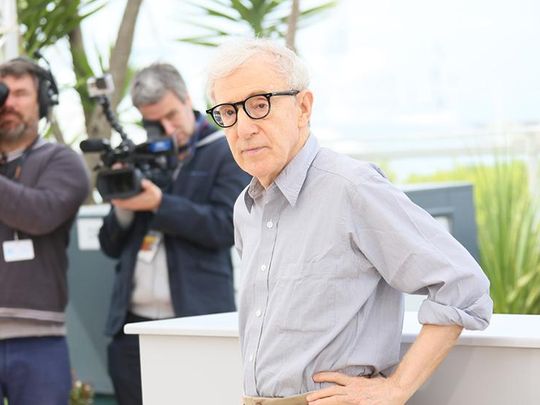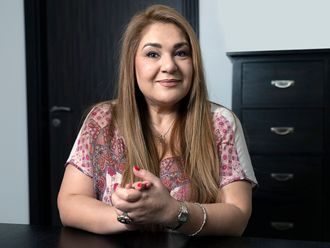
“For my entire life my films have struggled commercially,” says Woody Allen. “Now we’ve finally found out that all it really required for one of them to do big business was, you know, a major catastrophe.”
The 84-year-old director, on the phone from New York, is reflecting on the news that his rose-tinted romantic comedy A Rainy Day in New York has topped the global box-office chart during the coronavirus outbreak. In the only voice I’ve ever heard that can twinkle with despair, Allen says he’s hopeful this lucky streak will continue, and the release of his next film coincides with nuclear war, or an asteroid hitting Earth.
Since 1966, Allen has averaged almost one film per year, and was supposed to be shooting his 50th this summer. Then the pandemic struck and all there is for him to do is potter: practise the clarinet or go for “brief, defensive walks” around the neighbourhood with Soon-Yi, his wife of 22 years. He’s also written a new play – on the Olympia portable typewriter he’s been using since he was 16, when he spun one-liners for Broadway columnists from his parents’ kitchen table in Brooklyn – which he’ll “throw in a drawer until life returns to the planet”.
The New York the world knows is in part an Allen creation. It’s the city of Annie Hall, Hannah and her Sisters and Radio Days; the natural habitat of the urbane, neurotic, ambitious man in corduroy and tweed. But the toll the pandemic has taken on his home town has been “a complete curse out of science fiction; perhaps the worst thing I’ve ever witnessed”. He says the city feels even less like itself than it did in the aftermath of 9/11.
Allen lost a close friend to Covid-19 last month, banjo player Eddy Davis, who led the jazz band with which he has played clarinet for some 35 years. “It was a tragic thing,” Allen says. To the average onlooker, he might not appear to have many long-standing allies left to lose. In 2014, while the director was being honoured at the Golden Globes, his estranged son Ronan Farrow, then embarking on a career as an investigative journalist, took to Twitter to call him a paedophile. “Missed the Woody Allen tribute,” began Ronan’s tweet, which has since been deleted. “Did they put the part where a woman publicly confirmed he molested her at age seven before or after Annie Hall?”
The woman in question was Ronan’s sister Dylan, whom Allen was accused of sexually abusing in 1992 at the height of a bitter custody dispute with Mia Farrow, his partner of 12 years and the star of some of his best films. The claim was investigated at the time by the Child Sexual Abuse Clinic at Yale New Haven Hospital and the New York State Department of Social Services – which independently concluded that Dylan had not been sexually abused – and no charges were ever brought against Allen. But his subsequent loss of the custody trial left wisps of suspicion lingering over the case, and his relationship with the then-21-year-old Soon-Yi – Mia’s adopted daughter from her marriage to Andre Previn – only thickened the fog.
Decades later, when the MeToo movement had caught fire, a revised account of the assault from Dylan seemed to many people to fit all too well with the other bales of dirty showbusiness laundry that were being heaved into the light. In 2018, Amazon Studios terminated Allen’s four-film deal three films early, which led to a now-resolved £52 million lawsuit and the company’s offloading of A Rainy Day in New York to smaller distributors worldwide. (In the US, it remains unclaimed.) And in March, the publisher Hachette dropped his forthcoming memoir Apropos of Nothing (subsequently rushed into print by a smaller firm, Arcade).
The intertwined downfall and rise of a father and son appeared to be the tale’s truly Freudian coup de grace. But now that the accuracy of Farrow’s reporting has been called into question by The New York Times and others, what does Allen make of his offspring’s ascent?
“Up until a couple of days ago I would have said, ‘Gee, this is great, he’s done some good investigative journalism and more power to him, I wish him all the success in the world,” he says. “But now people are beginning to realise that it isn’t just in relation to me that his journalism has been kind of shoddy, and I’m not so sure that his credibility is going to last.”
Dispassionate doesn’t quite capture Allen’s tone as he talks about this. The emotional drawbridge was clearly hoisted up years ago, and though he happily answers any question you put to him, it still feels as if you’re standing on the far side of the moat, throwing stones at the portcullis. The same equanimity comes into play when he talks about the actors who have publicly disowned him since the revival of Dylan’s accusation, including Colin Firth, Greta Gerwig, Ellen Page, Kate Winslet (more opaquely), and now Timothee Chalamet, who leads the cast of A Rainy Day in New York, as a bookish gadabout whose romantic trip to Manhattan with his girlfriend Ashleigh (Elle Fanning) goes whimsically awry.
In a January 2018 Instagram post, Chalamet said he’d come to realise “that a good role isn’t the only criteria for accepting a job” and he would donate his salary to charity. In his book, Allen explains away Chalamet’s mea culpa as an Oscar campaigning manoeuvre. “He made a mistake,” Allen says. “But people will do things for their careers. [...] I liked him, and I was surprised when he denounced the project – well, not the project, but me.”
Did Allen ever worry his career was over? “Every now and then there’s an annoying little glitch when an actor says they’re not going to work with you,” he says, the drawbridge holding firm. “But I just get a different actor. Not the end of the world.”
When I ask about Mia Farrow, he says he “can appreciate her acting very much,” despite their quarrels. “I have no problem separating the art from the artist whatsoever. I can see Triumph of the Will and acknowledge that Leni Riefenstahl” – Hitler’s favourite filmmaker – “was a magnificent director, even though what she stood for was pretty awful.” Given that Allen has himself been the subject of endless art-versus-artist debates, I think it’s just a tone-deaf remark from a man who has talked himself inside out on an extremely painful subject.
After the custody hearing, he says he found himself waiting for a reappraisal that never came: “the moment the public thought ‘It’s just so illogical that this guy would do this,’ and I’d be given the benefit of the doubt.” He’s stopped waiting now, though.
“I think it will be this way for the rest of my life, and probably the rest of my death too,” he says. He speaks like a man who’s at peace with his sentence.
A Rainy Day in New York is available online.
The Daily Telegraph












